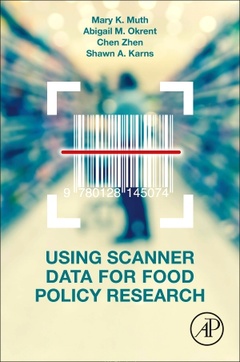Using Scanner Data for Food Policy Research An Economists Guide
Auteurs : Muth Mary K., Okrent Abigail, Zhen Chen, Karns Shawn

Using Scanner Data for Food Policy Research is a practitioners? guide to using and interpreting scanner data obtained from stores and households in policy research. It provides practical advice for using the data and interpreting their results. It helps the reader address key methodological issues such as aggregation, constructing price indices, and matching the data to nutrient values. It demonstrates some of the key econometric and statistical applications of the data, including estimating demand systems for policy simulation, analyzing effects of food access on food choices, and conducting cost-benefit analysis of food policies.
This guide is intended for early-career researchers, particularly those working with scanner data in agricultural and food economics, nutrition, and public health contexts.
1. What is Scanner Data and why is it Useful for Food Policy Research? 2. Sources of Scanner Data across the Globe3. Label and nutrition data at the barcode level4. Methodological Approaches in Using Scanner Data5. Insights from past research using scanner data6. Application: Estimating food demand systems using scanner data7. Application: Measuring the food environment using scanner data8. Application: Conducting cost-benefit analysis using scanner and label data
Abigail M. Okrent, PhD, was a research economist at the US Department of Agriculture Economic Research Service where she investigates the role of food and farm policies on food choices and diet quality. Her current research uses household and retail scanner data to analyse determinants of food choice and its implications for health outcomes.
Chen Zhen, PhD, is an associate professor of agricultural and applied economics at the University of Georgia. He holds the UGA Athletic Association professorship in Food Choice, Obesity, and Health Economics. He develops advanced and practical statistical models of consumer food purchase behaviour using scanner data to study policy issues such as sugar-sweetened beverage taxes, shelf nutrition labelling, food costs, and food assistance programs.
Shawn A. Karns is a Senior Public Health Analyst in RTI International's Food, Nutrition, and Obesity Policy Research Program where she has developed extensive experience analysing store-based and household-based scanner data for food policy research. She has served as data manager and senior analyst on several studies using scanner data, including to analyse the effects of hypothetical restrictions on foods purchased using SNAP benefits; to estimate the costs of labelling
- Describe different types of scanner data, the types of information available in the data, and the vendors that offer these data
- Describe food-label data that can be appended to scanner data
- Identify key questions that researchers should consider when acquiring scanner and label data for food policy research
- Demonstrate how to use scanner data using tools from econometric and statistical analyses, including the limitations in interpreting results using the data
- Describe and resolve key methodological issues related to using the data to facilitate more rapid analyses
- Provide an overview of published literature as background for designing new studies
- Demonstrate key applications of the data for food policy research
Date de parution : 10-2019
Ouvrage de 342 p.
15.2x22.8 cm



